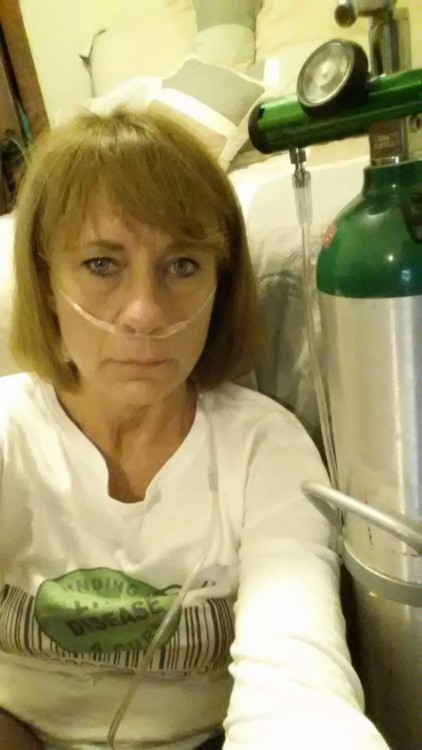Most of you will probably think I’m quite strange for making this statement, but I actually love my peripherally inserted central catheter (PICC) line! And my oxygen tank, and any of the other equipment that I sometimes need as a result of my illness. Before you judge me, please let me explain.
Having a mostly “invisible” illness can be extremely frustrating at times. When you tell people you are sick, they often look at you with a skeptical stare, or give you the standard obligatory responses that are supposed to mimic genuine concern and compassion. Having had this illness for over a dozen years and treating for almost 10, I’m quite used to this commonplace response. But even though I’ve become accustomed to it, it doesn’t change the fact that I want to respond by screaming at them from the top of my lungs, “But you just don’t understand! It’s so damn awful! I feel like I’m dying sometimes! Hell, I almost did die on multiple occasions! You just don’t get it! It really truly is a living hell! A nightmare I can’t wake up from! How can I make you understand? Hear me! Understand me! Please!” (Insert image of me collapsing to my knees in a fit of uncontrollable, gut-wrenching sobbing here.)
Then if they had a month or two, I would try to explain what I’ve been through over the last dozen years — all the doctors, the misdiagnosises, the mistreatment, the hospitalizations, the surgeries, the medications, each and every debilitating symptom in great painstaking detail, the financial devastation. But it wouldn’t matter. There is no way to truly comprehend it unless you actually live it. And as much as I want people to understand, I wouldn’t wish the nightmare of chronic late-stage neurological Lyme disease (and multiple co-infections) on anyone.
What people don’t understand they often can’t (or won’t) acknowledge. It might be easier for them to just stay ignorant about the person’s illness or think that it couldn’t really be as bad as the person is saying. Sometimes they truly believe it doesn’t even really exist and think you are just making it all up, looking for attention and sympathy and prefer to be lazy, or are looking for people to cater to your every need. It may be easier to for people to believe these horrible things about a person than it is to believe a disease exists that can knock someone on their ass so completely that life as they knew it is stolen and forever changed — yet they can still look perfectly fine much of the time.

Thus the reason for my opening statement. Sometimes I feel the need to prove to people that I’m not making it up and just looking for attention — that I really am that sick! The items mentioned previously — the PICC line, the oxygen tank, the wheelchair, the cane — are sometimes the only tangible “proof” I have. A PICC line, which is surgically placed through your arm and to your heart for the administration of twice daily IV medications, cannot be placed unless there is documented proof that you need it. I have had enough “documented proof” of bacteria burrowed into my brain, organs, muscles, tissues and joints that I have now had 10 PICC lines, two central lines and one Groshong PICC. I have had various “lines” hanging out of my body for years. Same holds true for the oxygen. There has to be a legitimate reason for a prescription for those little tanks that help me when my oxygen levels drop and the pressure in my head and chest makes it feel as if it will burst open. So again, there really must be something wrong with me if it has been warranted that I need that. These are the tangible things people will acknowledge. These are the things most people associate with “being sick.”
I hate the fact that this many years into it, I still feel the need to prove to people how debilitatingly sick I really am. I feel for each and every person with an invisible disability who goes through this same lack of recognition and understanding. I wish the world would spend more time seeking to understand each other. To put the time and effort into trying to imagine — to the very best of their ability — what another person may be going through and what they must be feeling.
True understanding and compassion is so rare these days, and it often feels like something we need to fight for instead of something that is just naturally given. As I’ve said, people can’t completely understand anything unless they’ve actually been there — but I sure wish they would at least try.
Follow this journey on Lymie Jenny Lives.
The Mighty is asking the following: What’s one thing people might not know about your experience with disability, disease or mental illness, and what would you say to teach them? If you’d like to participate, please send a blog post to community@themighty.com. Please include a photo for the piece, a photo of yourself and 1-2 sentence bio. Check out our Submit a Story page for more about our submission guidelines.
